WHITFIELD'S SAFES, OXFORD STREET, BIRMINGHAM
Samuel Whitfield and Sons of Viaduct Works, Oxford Street,
Birmingham, and 140 Grand Buildings, Trafalgar Square, London, W.C.2.
Samuel Whitfield was born in Birmingham in about 1810. In 1851 he
lived in Edgbaston with his wife Hannah and his seven children: Samuel
B. Whitfield, Mary B. Whitfield, Frederick Whitfield, Herbert Whitfield,
Anne Whitfield, James Whitfield , and Emily S. Whitfield.
In 1861, Samuel and his family lived in Deritend, Aston. He is
described in the census as a manufacturer of fireproof iron safes,
metallic bedsteads and bedding, employing 47 men, 21 boys and 19 women.
In 1866 the company manufactured Fenby's adytic retainer lock.
In 1869 the firm produced fire and burglar proof safes and locks, and
Whitfield's New Patent Safes.
By 1871 the business had grown. The metallic bedstead manufacturing
part of the business employed 77 men, 26 women, 64 boys and 10 girls.
The fire proof lock manufacturing part of the business employed 23 men
and 10 boys. There was also a brass foundry employing 15 men, 10 boys, 1
women and 1 girl.
By 1881, Samuel had retired and lived with his wife in Leamington. His
son Samuel B. Whitfield took over the metallic bedsteads part of the
business, and presumably one of his other children took over the lock
and safe making business.
In 1886 the firm became Whitfield's Safe and Door Company. Around
1900 it was acquired by J. T. Needs & Company and in 1910 the
engineering works moved to Oldbury Place.
In 1945 the business was acquired by Milners Safe Company and in 1952 it
went into voluntary liquidation.
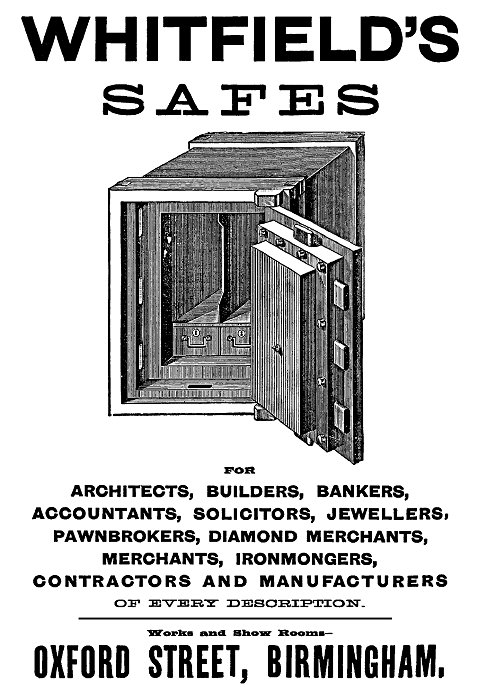
An advert from 1896.
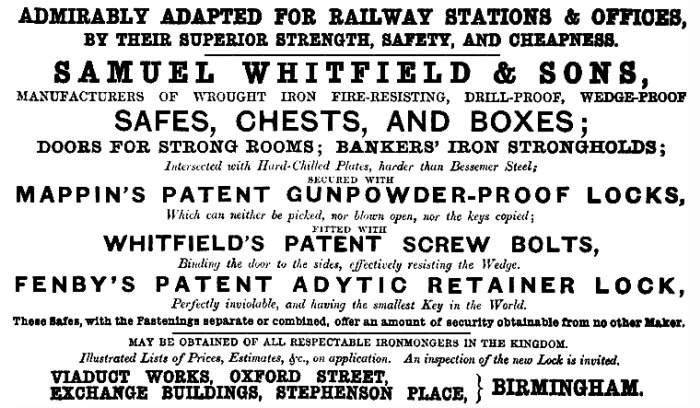
An advert from 1868.
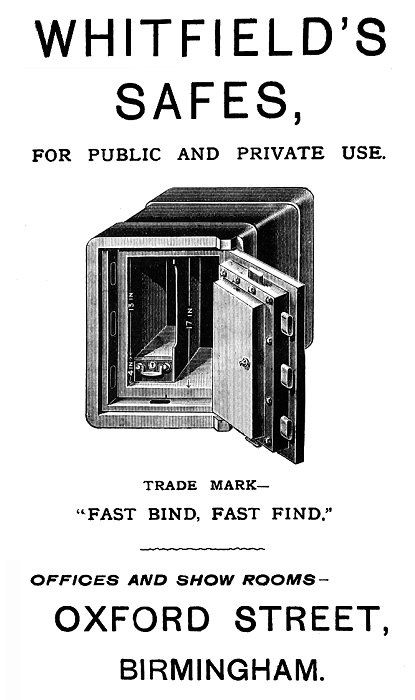
An advert from 1904.
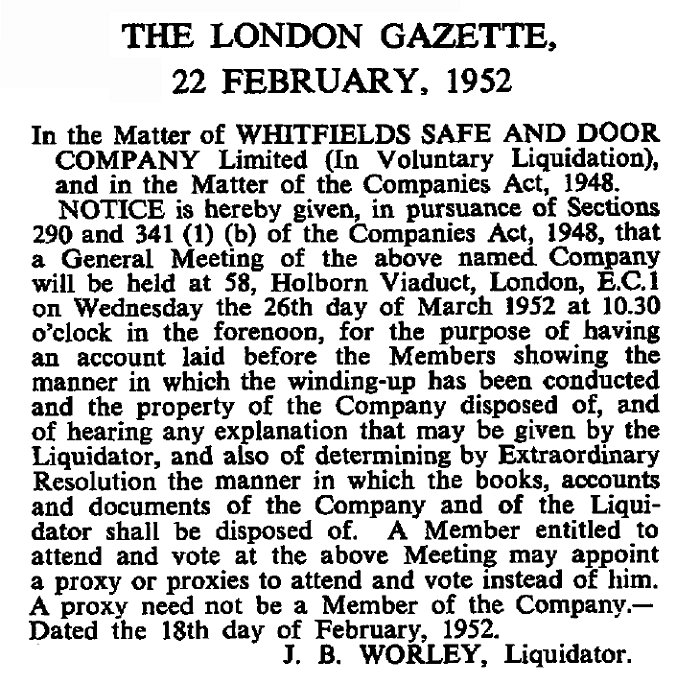
SAMUEL WILKES, EXCELSIOR WORKS, PARK ROAD, BLOXWICH
The Wilkes family started in business in Bloxwich as locksmiths and
door furniture manufacturers in 1874. By 1954 the original company
had built up cash reserves and, to enable these to be distributed to
shareholders, the company was liquidated and the trading assets were
transferred to a new company, Samuel Wilkes and Sons Ltd on the 1 June
1954.
At some time James Bailey and Co. Ltd were incorporated into the
company and in 1977 they were trading as Samuel Wilkes and Sons Ltd
Incorporating James Bailey and Co. Ltd, making locks, hinges and
pressings for railway carriages, passenger and commercial vehicles.
The company traded in the manufacture of locks etc., acquiring Thomas
Herbert and Co. (Willenhall) Ltd (q.v.) on the 14 November 1969;
Hodges Locks and Pressings Ltd (q.v.) on the 15 November 1971;
H.D. Jackson Co. Ltd. (who made office staplers and ball bearings) on
the 5 November 1973; and J. G. Beddows Ltd (q.v.) on the 20
December 1976.
Except for J.G. Beddows, whose plant was moved into the Bloxwich site
immediately they were acquired, the manufacturing facilities and
services that were operated by Samuel Wilkes and Sons Ltd, Hodges Locks
and Pressings Ltd, and H. D. Jackson Co. Ltd were combined under a new
division known as Samuel Wilkes and Sons Ltd. (Manufacturing Division).
They also created two new marketing divisions for sales, namely Samuel
Wilkes and Sons Ltd (Engineering Division) and Samuel Wilkes and Sons
Ltd (Luggage Fitting Division). The Luggage Division was to handle
orders previously dealt with by Hodges Locks and Pressings Ltd., H. D.
Jackson Ltd and the James Bailey Trunk Department of Samuel Wilkes and
Sons Ltd. The Engineering Division was to handle orders relating
to rail, motor vehicles, presswork, bearings, and general engineering
products. The Managing Director at this time was J .D. Lisle, who
had come from the Hodges Lock side of the business.
In 1979 receivers were appointed and entered into an agreement with a
new company known as Samuel Wilkes (Engineering) Ltd for the hiving down
of the trading assets except the freehold property. On the 1
February 1980 the receivers sold the issued share capital of Samuel
Wilkes Engineering Ltd. The company still traded in 1997 from
premises at Newfield Close, Walsall, in business as specialists
designers and manufacturers of locks, hinges and general engineers.
The cabinet locks side of the business (the former Hodges Lock work) was
purchased by Liston Products Ltd.(q.v.), who continue to make the
"Hodges" range of cabinet locks in 1996.
DAVID WILLIAMS AND SON, 68A TEMPLE STREET, WOLVERHAMPTON
Cabinet and padlock makers. In 1936 they were at 73b Raby
Street, Wolverhampton.
In 1953 they were at Temple Street. Not in existence in 1970.
Nothing else known.
GEORGE WILLIAMS (WILLENHALL) LIMITED, 31a WALSALL ROAD, WILLENHALL
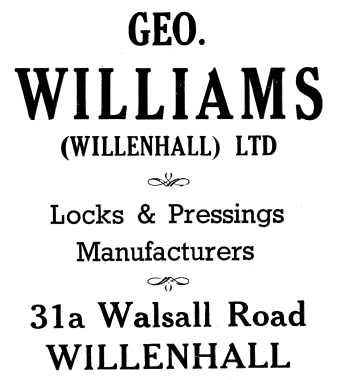
An advert from 1954.
THOMAS WILKINSON AND SON, 47 ESSINGTON ROAD, NEW
INVENTION
Key maker of the traditional key filing type. Existing in 1921.
In 1936 Mrs S Wilkinson is listed as a key maker at 47 Essington Road.
Run by Harold Wilkinson into the 1970s, when he was dealing mainly as a
factor and finishing a few castings.
WILLENHALL ENGINEERING LTD. 7-11 FROYSELL STREET,
WILLENHALL
Set up in about 1988 to manufacture five and six lever padlocks,
furniture fittings and repetition turned parts. In June 1994 they
took over the lockmaking side of Atlas Harrison (q.v.), to add the
Belfry range of padlocks and mortice locks to their range.
In about 1995 Alan Ash, formerly of ABT and Morris Springs, took over
the company in a management buyout.
In October 1996 Willenhall Engineering acquired Lockstock, which
manufactures locks and fittings for UPVC aluminium and timber windows
and doors, from owner Richard Morton for an undisclosed sum. The
merger of the two companies has created a business with an annual
turnover of £2 million with 50 employees.
In March 1998 Stockwell Engineering sold its padlock making business
to Security Engineering plc (q.v.). Chairman Alan Ash said that
the deal formed part of a strategic realignment of its Willenhall
engineering products. "This enables them to concentrate on their
core business, namely hardware products and components for the PVC-U and
aluminium door and window industry, whilst safe guarding employment for
those currently employed in the padlock part of the business".
Around 10 people who work at the padlock firm will be kept on.
WILLENHALL LOCKS LTD. STRINGERS LANE, WILLENHALL
See Keys of Steel (q.v.)
WILLEN KEY CO. LTD. WALSALL ROAD, WILLENHALL
The Willen Key Company was founded in 1903 by James Walker, with an
office, showroom and stores at No 77 High Street Battersea. The
twenty year old Mr Walker named his company "Willen" after the
Staffordshire town of Willenhall, the home of English locks and keys.
Mr Walker's practical experience and youthful zest soon established his
new company as a leading supplier of keys and locksmiths sundries in the
south of England. Willen's first catalogue, brought out in1909,
illustrated 55 pages of keys, blanks and ironmongers items.
Gradually the firm extended its range to include lawn mowers and garden
tools; but its reputation was still based on being a specialist in keys
and blanks. Every new blank of British and foreign origin was
immediately put into stock. When its 1922 catalogue was issued,
the "Ironmonger" wrote: "there is still a number of misguided
individuals who are under the impression that they can do better by
dealing direct with a maker rather than a factor. They overlook the fact
that sometimes the wholesale man is a specialist and can offer a bigger
choice than the manufacturer. To such we commend for careful attention a
catalogue which has just been issued by the Willen Key Co."
| By 1923 the scope of Willen Key’s activities had
increased to such an extent that it was decided to move to
larger premises in Bath Street off City Road EC1.
The new
premises included a showroom where the company's range of tools,
locks, keys, garden requisites and hardware was displayed.
In 1938 Willen Key was registered as a limited company with
Mr Walker as director.
Five years previously he had made an
important appointment for the future of his company: he engaged
a trainee representative, Robert Allen. |
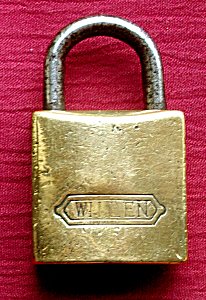 |
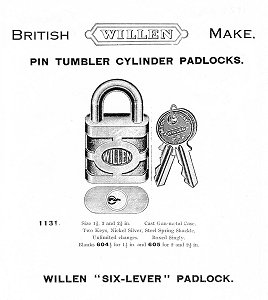 |
Trevor Dowson has provided this advert from 1929.
Although the advert says the locks are British Make they do not
actually claim to have made them themselves. |
Willen Key suffered their share of war damage: their
Bath Street offices were destroyed. Undeterred however, the company
moved to the home of locks and keys and established itself in
Willenhall. The manager was W H (Billy) Deering who earned himself
the nickname "Padlock Harry" within the trade, as at the beginning of
the war he went round all the local pad lock makers and gave them orders
to produce padlocks. With general orders drying up due to the war,
he was quickly overrun with padlocks and had to find other warehouse
space to keep them. He still had many left at the end of the
war.
When the bombing was over and the head office staff
returned to London, the Willenhall branch carried on as a new and
thriving limb.
|
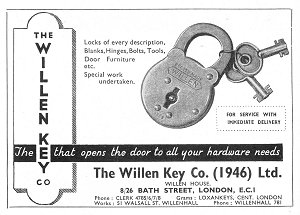
|
An advert from The
Ironmonger Guide 1950. The advert refers to "Locks of every
description, Blanks, Hinges, Bolts, Tools, Door Furniture etc.".
|
The company continued to prosper, opening branches in Belfast in 1953
and Bristol in 1963. On the 2 October 1972 the Willen Key and
Hardware Company Ltd was acquired by GKN, who amalgamated their own
distribution company of Nettlefold & Moser with Willen Key to form
Nettelfold-Willen Ltd, with Robert Allen at its head and head offices at
Summer Road, Peckham. From this point the company's interest in
locks and keys waned and they concentrated on the GKN core business of
screws. Further changes took place in January 1977 when
Nettlefold-Willen Ltd was amalgamated with Netmos Hardware to form GKN
Distributors Ltd. By this time the Willenhall Warehouse had been
closed and the sale of locks and keys was finished. So ended the
company that had become the household name for locks and keys and whose
catalogue was the bible for everyone in the trade. (Ref. leaflet
published by Nettlefold-Willen, 1972)
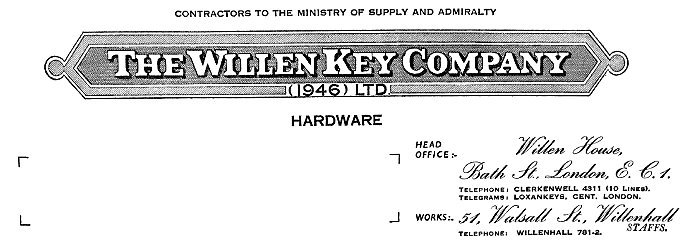
A letterhead.
DAVID WILLIAMS AND SON, TEMPLE STREET,
WOLVERHAMPTON
Key maker. In Existence in 1953. Nothing else known.
WITHERS SAFES, WEST BROMWICH
for the story of George Withers, Mary Withers,
Thomas Withers, Samuel Withers, Jesse Withers (and Richard Antcliff of
Brisbane and Harry Antcliff of Birmingham) :-
Read the
history
of the Withers family and their safes |

|
JOSEPH WOLVERSON, WILLENHALL
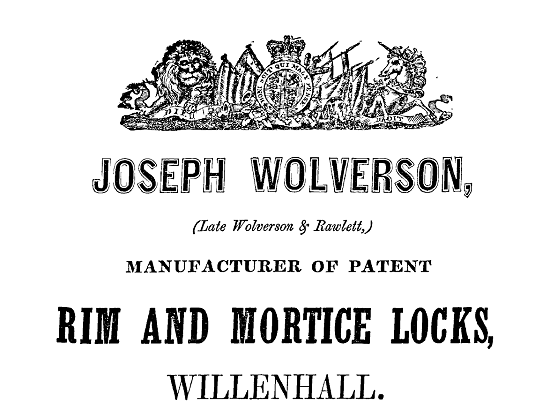
An advert from 1851.
GEORGE D. WOOD LIMITED, CLOTHIER STREET, WILLENHALL
The business, which was founded in about 1882 became well known for the
manufacture of Scarboro' trunk locks, handles, coal vase mountings etc.,
many of which were exported. In 1932 the business, the factory,
machinery and plant were put-up for sale. The buildings included an
enquiry office, a general office, a private office, a double-span
north-lighted press shop, a casting shop, a stamping shop, an engine
house, a polishing shop, a plating shop, a lean-to wrapping warehouse
with office, toilets, and a concreted yard.
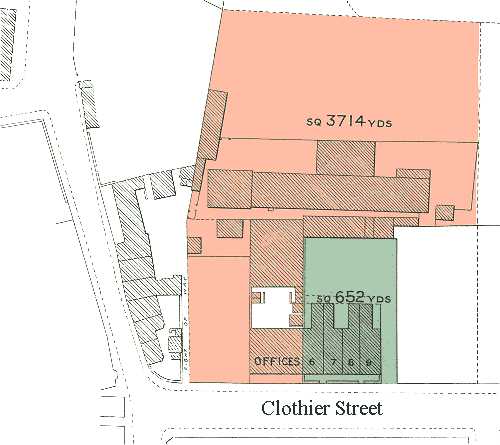 |
The plan of George D. Wood Limited's
site from the 1932 sales catalogue.
The factory, which survived until a few
years ago, was later extended. |
The following list of plant and machinery is from the sale catalogue:
Stamping Shop - 5 fly presses, a drop-stamp with 9½
inches between slides, a drop-stamp with 7½
inches between slides, guillotine shears, a 2ft. 6 inch turning lathe,
and overhead line-shafting.
Engine House - a 25hp. Crossley gas engine,
a gas bag, 3 water tanks, a 'Trump' belt mender, a Willdigg Brothers S&
S lathe, and overhead line-shafting.
Polishing Shop - 12 fly presses, 4 Leg
vices, 4 Hubbins vices, 2 bench drilling machines, vertical drilling
machine, emery wheel bob, 9 overhang bobs, 6 polishing lathes, a
centrifugal dust extractor, hand shears, stove and piping, and overhead
line-shafting.
Plating Shop - fly press, wood swilling-out
vat, gas-heated potash vat, 2 electric metal-lined wood vats, metal hot
water tank, electric metal brassing vat, drying bin, 2 old wood vats,
and all fittings.
Old Warehouse - 4 inch bench vice.
Second Warehouse - 1 Fly press.
Top Warehouse - 1 hand press.
Press Shop - 28 fly presses, 1 Sweeney &
Blocksidge stem press, 1 Sweeney & Blocksidge blanking press, 10 Leg
vices, 8 Hubbins vices, 3 bench vices, 2 rolling machines and gauges, 3
stoves and piping, 1 swage block and stand, 1 anvil.
New Shop - 1 galvanised tank, 1 lacquering
stand.
Casting Shop - 1 wood trough 9ft. long, 7
iron casting boxes and clamps, 2 Hill & Son casting furnaces.
Yard - 1 Time Recording Clock Company
timing clock and racks.
The company also owned four dwelling houses
that were next to the factory (nos. 6, 7, 8, and 9 Clothier Street).
WORMOLD PATENT LOCKS CO. LTD. 139 NORFOLK STREET,
SHEFFIELD
In existence in 1905 when they patented a padlock for use by the
electricity and gas authorities for sealing pre-payment meters.
Over the years they specialised in this application with their
self-locking meter locks. They made lever locks with shaped
keyholes, and nozzle locks with hinged shackels. Still in
existence in 1998.
DAVID WORRALL, FLETCHERS LANE, WILLENHALL
|

|
David Worrall was a relation of the family who
owned John Worrall, where he worked until he set up on his own
in Fletchers Lane, Willenhall, making mortice locks, in the late
1940s. |
David died in the late 1950s and the business was carried on for some
years by his wife and her sister Lucy, until his son Michael took over
the running of the business. He expanded the business to include a
turned parts section, which became the major part of the business.
With the recession in the motor industry, they tried to resurrect the
lock making side that they had let tick over in the hands of David’s
wife and her sister; but they were unable to raise enough business and
closed down. (In existence in 1949 Willenhall Trade Directory.
In existence in December 1976 (AH records))
THOMAS WORRALL AND CO. CATHEDRAL WORKS, 17 DOCTORS PIECE,
WILLENHALL
|
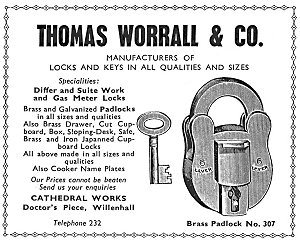
|
Manufacturers of galvanised padlocks, also brass
drawer, and brass and iron cupboard, locks. In 1921 were
at 48 Lower Lichfield Street.
In 1936 were listed as at
Doctors Piece. Existing in 1974. Closed after 1974
and premises were later taken over by Quality Lock. (q.v.) |
JOHN WORRALL AND SONS LIMITED. THE CRESCENT LOCK WORKS, WILLENHALL
In 1815 a Charles Hartill produced padlocks in a cottage in the
Crescent, Willenhall. This cottage was later to become part of the
firm of John Worrall and Sons Ltd. In 1895 the Worrall family
purchased the premises at 22 The Crescent and John Worrall began to make
locks in about 1895 and was listed at the time as a manufacturer of rim and
dead locks and patent four hand night latches.
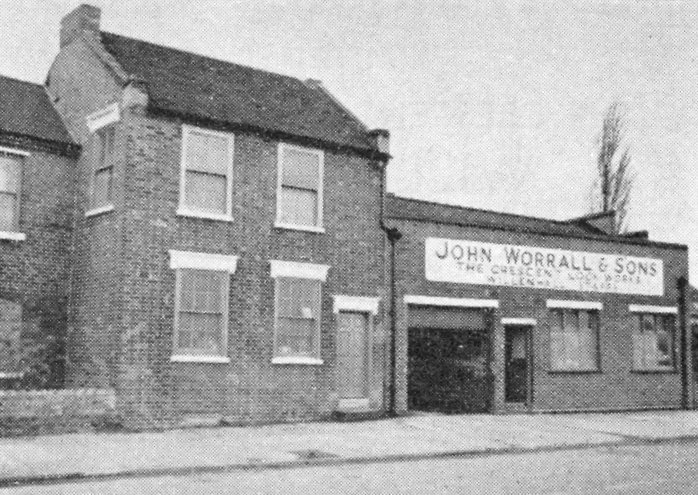
22 The Crescent, Willenhall.
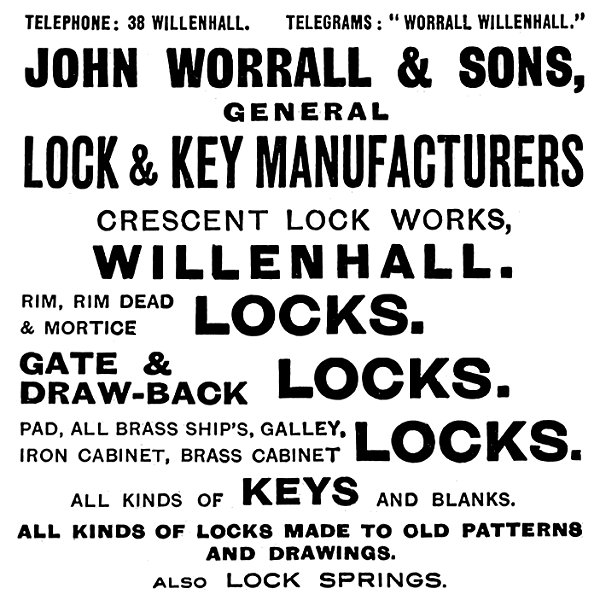
An advert from 1913.
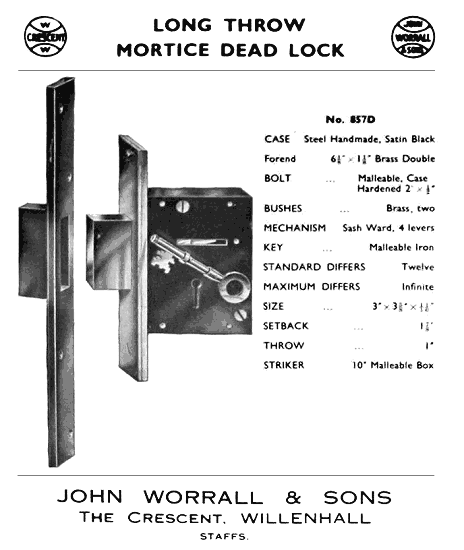 |
John and his wife had nine children, most of whom worked in the
family business at some time. Ivor ran the business along with his
father. In the 1930s Len Llewellyn joined the company for a wage
of 7/6 per week and Mr. Cooper also joined as salesman. He then
married the bosses daughter and when John Worrall died Ivor, Len and Mr
Cooper ran the business. During this period the workforce grew to
over 150 people. Other members of the family also worked in the
business at various times. Guy later left to set up an
architectural hardware business.
Lloyd set up in London, factoring
locks and keys. Thomas (q.v.) set up as a lock maker in Doctors
Piece in the early 1920s. And David set up as a lock maker in
Fletchers Lane in the late 1940s. (Was there another brother who worked
for the firm?) |
| When Ivor Worrall died, Mr. Cooper set about acquiring all the
family's shares and took over the running of the business with the help
of Len Llewellyn. Len would eventually become a 25% shareholder in
the business when they became a limited company on the 7th February
1963. Mr. Coopers son, Harry (born 1925), joined the business
in about 1962 and took over the reigns from his father when he retired. Harry continued to run the business along with fellow director Len
Llewellyn.
The original workshops consisted of a row of cottages, a brew house
and a two storey workshop at the rear of the cottages. A new
workshop was built in 1925 behind the original cottages. In 1935
part of the row of cottages was demolished when a new frontage, and
extra workshops including a brass casting shop, were built.
The
remaining cottages were kept as a store. Further new workshops
were built in 1968 to allow the company to concentrate on the production
of five lever mortice locks and padlocks. |
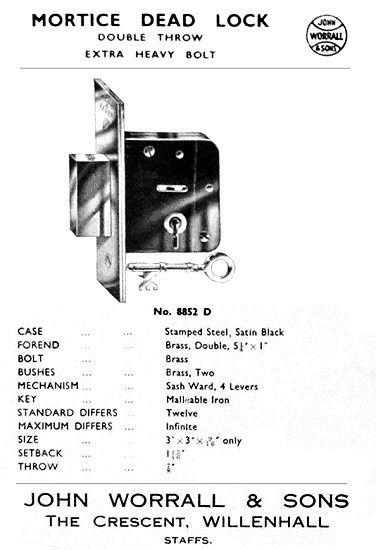 |
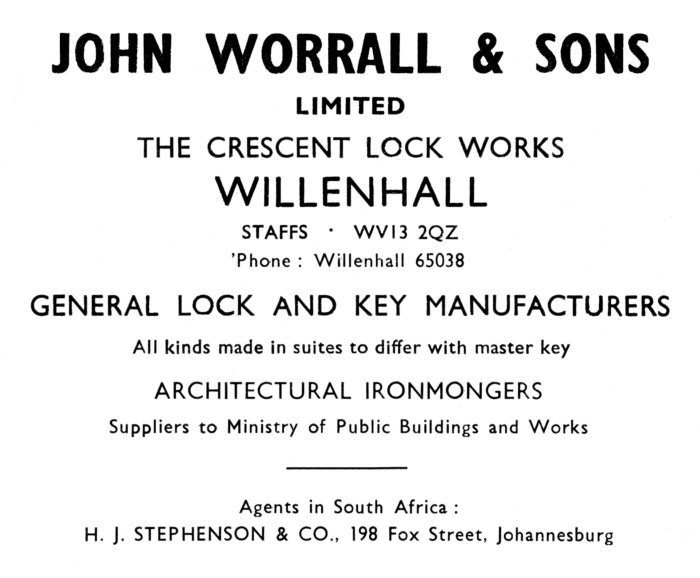
An advert from the early 1970s.
In 1985 there was a work force of about 45 but pre war the numbers
had been as high as 100. Harry Cooper and Len Llewellyn retired in the
1980s, leaving their sons Dominic Cooper and Andrew Llewellyn to run the
company. Harry Cooper, who had been a traveller for the company,
lived in Fisher Street, Willenhall.
Andrew resigned as a director in the early 1990s,
finishing 60 years of service by the Llewellyn family at John Worrall
and Sons Limited. Harry Cooper died on the 24th December,
1999 at the age of 74, leaving Patricia A. Cooper and Dominic J. Cooper as
directors.
In April 1999 the firm employed about 12 people, and in May 2000 employed 11.
On the 31st March, 2000 they took over the manufacturing
rights and tooling of all cabinet locks previously made by H. E. Fletcher
(qv). (Industrial Heritage Winter 1985)( Blackcountryman Vol. 4-1)
(Dominic Cooper)
Sales fell because of foreign competition. The site at
The Crescent closed and was sold in 2003. The firm became Worrall Locks
Limited, which had been incorporated on the 16th February, 1988 and was
based at Sutton Coldfield. As well as making locks, Worrall Locks was
also a wholesale supplier of hardware, plumbing and heating equipment.
The company was dissolved on the15th March, 2016.
| Read an account of
John Worrall and Sons |

|

|
|

|
| Return to Locks
and Safes |
|
Return to the
list of makers |
|